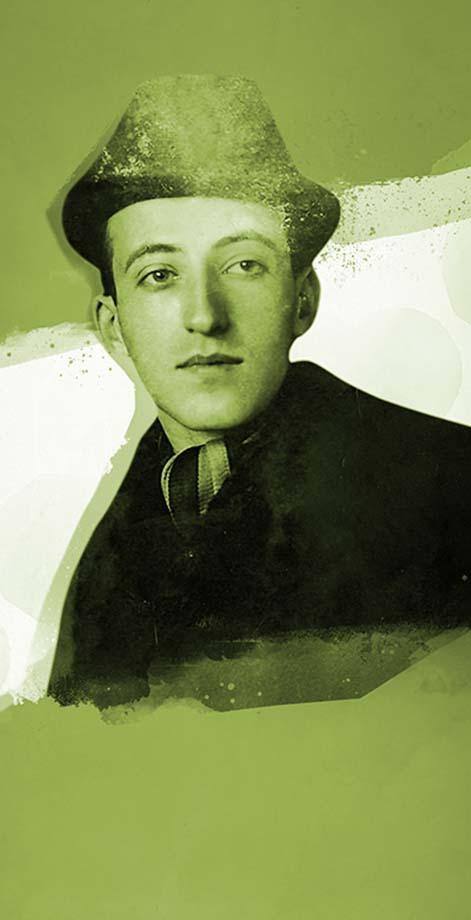
21. 1. 1897, Teplice — říjen 1944, KL Auschwitz-Birkenau
Kabaretiér a dramatik. Působil jako provozní ředitel Vídeňského komorního orchestru. V terezínském ghettu psal satirické texty a hrál v tamním německojazyčném kabaretu.
Leopold (Leo) Straus se narodil 21. ledna 1897 v severočeských Teplicích. Byl synem hudebního skladatele Oscara Strause a houslistky a koncertní mistryně Helene Neumannové (známější pod uměleckým pseudonymem Nelly Irmen). Studoval právo na Vídeňské univerzitě a v roce 1920 zde získal akademický doktorský titul. Zpočátku byl zaměstnán v bankovním sektoru a poté mj. jako dramaturg a provozní ředitel Vídeňského komorního orchestru. Psal texty k různým revuím, včetně libreta k revui svého bratra Erwina Der Tanzende Shylock: Revue um jeden Preis in zwei Teilen (Tančící Shylock: Revue za každou cenu ve dvou částech). Jeho manželkou byla Myra Gruhenberg, novinářka, spisovatelka a hudebnice.
Po nástupu nacistů k moci v roce 1933 byla díla Lea a Myry zakázána. Poté, co bylo Rakousko v roce 1938 připojeno k Třetí říši, byli oba s ohledem na svůj židovský původ propuštěni z práce a zbaveni práva znovu se zaměstnat.
Leo a Myra byli deportováni do ghetta v Terezíně 1. října 1942. Oba se neprodleně zapojili do tamního kulturního života. Leo působil jako konferenciér v kabaretu „Straus-Brettl” (Strausovo divadélko). Pro kabaret napsal mj. text Die Stadt Als-Ob (Městečko Jen jako). V témže kabaretu vystupovala i jeho žena Myra a Kurt Gerron. Leo a Myra byli dne 12. října 1944 transportováni do KL Auschwitz-Birkenau, kde oba zahynuli.
As-If Town („Als-Ob”)
Text: Leo Straus
Music: unknown
Voice: Bente Kahan
Piano: Dariusz Świnoga
Violin: Mirosław Kuźniak
Recording from the „Cabaret Songs from the Theresienstadt Ghetto” CD by Bente Kahan, Dybbuk International, 2018.
The „As If” Town („Als-Ob”)
Translated into English by Dahlia Pfeffer Luxemburg
I know a little city,
where order can be found
The name is rather witty,
it’s called the “As-If” town
Not everyone’s permitted,
an entry to this place
Just the specially selected,
who belong to the “As-If” race.
They live a life prosaic,
“as if” real life it were
Enjoying tales archaic,
“as if” the truth it were.
The people on the streets,
make haste and plunge along
To finish inane deeds,
they act “as if” daylong
The Cafè in the center,
like Café de l’Europe
With music and the banter,
one feels “as if” there’s hope.
And people treat each other,
to gestures crude and stiff
At home they were nobody,
here they pretend “as-if”
And all day long one sips,
“as if” coffee, however,
On Saturday, yes, on Saturday,
you get “as if” chopped liver
One lines up for one’s soup,
“as if” it were delicious
And searching with a loupe,
for food “as if” nutritious.
One lies down on the floor,
“as if” it were a bed
And dreams of days of yore,
“as if” letters had been read.
One bears the awesome fate,
“as if” it weren’t so bad
And talks about tomorrow,
“as if” one’s to be had.
Theresienstadt Questions („Theresienstädter Fragen”)
Lyrics: Leo Straus
Polish translation: Aleksander Gleichgewicht
Music: unknown
Arrangement: Ronen Nissan
Vocals: Bente Kahan
Violin: Marcin Markowicz, Malwina Kotz
Viola: Marzena Malinowska
Cello: Jan Skopowski
Double bass: Paulina Rosłaniec
Recording from the „Cabaret Songs from the Theresienstadt Ghetto” CD by Bente Kahan, Dybbuk International, 2018.
I Ask Most Politely („Ich bitte nicht lachen”)
Translated into English by Dahlia Pfeffer Luxemburg
I ask most politely, restrain your laughter slightly
Regarding present state of affairs,
the ovens erupting, the roofs are collapsing
But no reason for you to put on airs
I find it horrific when someone terrific
Unleashes anger violent, so loud,
When words become aggressive
Make good manners retrogressive
With no cause, oh what a crowd!
No, you have no clue, you fail to see, do you?
I listen to your view, but it won’t do
‘Cause we in Terezin
Lead lives of ease, we always grin,
For were it otherwise
We would capsize.
The place is full of men,
With virility and acumen,
My love is genuine for Terezin.
Gone are my mortgages,
I’m learning many languages
Despite a heart that’s longing for those days gone by.
‘Cause we in Terezin
Lead lives of ease, we always grin
And love our dearest little Terezin.